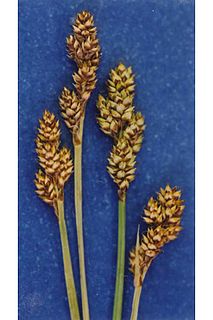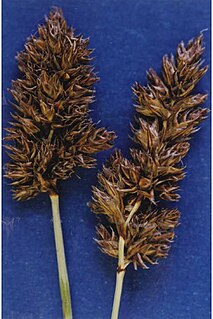
Carex abrupta is a species of sedge known by the common name abrupt-beaked sedge or abruptbeak sedge. It is native to the western United States from California to Idaho, where it grows in moist mountain habitat such as meadows.

Carex athrostachya is a species of sedge known by the common name slenderbeak sedge. It is native to western North America, including Alaska to central Canada, the western contiguous United States, and just into Baja California.

Carex capitata is a species of sedge known by the common name capitate sedge. It has a circumboreal distribution including Norway, Russia, Siberia, Alaska, Canada and Greenland. Growing in wet places in boreal forests and mountain meadows in alpine climates.

Carex illota is a species of sedge known by the common name sheep sedge. It is native to western North America, where it grows in wet places such as marshes and mountain meadows, from New Mexico and California north to Western Canada.

Carex jonesii is a species of sedge known by the common name Jones' sedge. It is native to the Western United States and grows in moist habitats.

Carex lenticularis is a species of sedge known by the common names lakeshore sedge and goosegrass sedge. It is native to much of northern North America, including most all of Canada and the western United States, where it grows in wet habitats.

Carex mariposana is a species of sedge known by the common name Mariposa sedge.

Carex nebrascensis is a species of sedge known as Nebraska sedge.
Carex petasata is a species of sedge known by the common name Liddon sedge.

Carex phaeocephala is a species of sedge known by the common name dunhead sedge.

Carex praeceptorum is a species of sedge known by the common names early sedge and teacher's sedge.

Carex raynoldsii is a species of sedge known by the common name Raynolds' sedge. It is native to western North America and grows in alpine to subalpine meadows.

Carex scoparia is a species of sedge known by the common names broom sedge and pointed broom sedge. It should not be confused with the unrelated grass species known as "broom sedge," Andropogon virginicus.
Carex sheldonii is a species of sedge known by the common name Sheldon's sedge.

Carex simulata is a species of sedge known by the common name analogue sedge.

Carex specifica is a species of sedge known by the common name narrowfruit sedge.

Carex concinna is a species of sedge known by the common names low northern sedge, northern elegant sedge, beauty sedge, and beautiful sedge. It is native to northern North America, where it occurs across Canada and in high elevations in the northern contiguous United States.

Carex breweri, known as Brewer's sedge, is a species of sedge that grows on dry rocky or gravel slopes in the Sierra Nevada and Cascade Mountains of the western United States, as far north as Mount Hood. It is classified in Carex sect. Inflatae, alongside Carex engelmannii and Carex subnigricans.

Carex rariflora, the looseflower alpine sedge, is a species of plant in the sedge family. It is found in the United States in Alaska and Maine, and in Canada in New Brunswick and Nova Scotia. In these regions, it is ranked as an obligate hydrophyte in establishing wetland areas. It prefers wet environments such as open bogs, meadows, seepage slopes, and low-elevation heath tundra. This perennial grass, which can be up to 3 feet tall, has fibrous roots, and holds all perennial organs underground. The leaves are alternate, long, narrow, and simple, with parallel veins. They grow in dense clusters, and the dead leaves are found at the base of the plant. The plant blooms and fruits in the summer. All flowers are monoecious and unisexual, producing a spike inflorescence. All inflorescences are subtended by shorter, proximal bracts.

Carex muehlenbergii is a species of flowering plant, it is a type of sedge. It is a grass-like plant in the family Cyperaceae. Its common names include sand sedge, Muhlenberg's sedge.


















